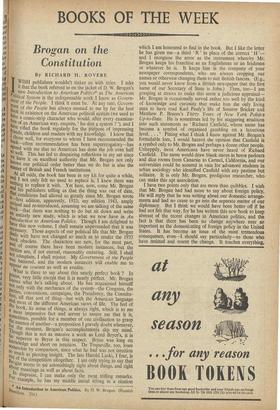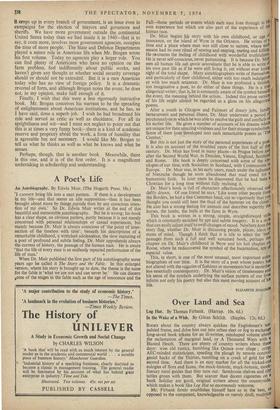BOOKS OF THE WEEK
Brogan on the Constitution
By RIq1ARD H. ROVERE IWISH publishers wouldn't tinker so with titles. I take It that the book referred to on the jacket of D. W. Brogan's „ new Introduction to American Politics* as The American. rolitical System is the indispensable work I know as Govern- net of the People. I think it must be. At any rate. Govern- Iblient of the People has always seemed to me by far the best Look in existence on the American political system (we used to ;`,ave a comic-strip character who would, after every examina- Pn of an American way, enquire, ' Iss diss a system ? '), and I "ave rifled the book regularly for the purpose of impressing iriceds, children and readers with my knowledge. I know that , chose well, for everyone to whom I have recommended the °°°k—often recommendation has been supererogatory—has _agreed with me that no American has done the job even half bn well. This has led to despairing reflections in my set since have it on excellent authority that Mr. Brogan not only *news our political order better than we do but is also the rnaster of British and French institutions.
At all odds, the book has been in my kit for quite a while, and I not only felt no need to replace it, I knew there was nothing to replace it with. Yet here, now. come Mr. Brogan ,Land his publishers telling us that the thing was out of date, l,'at conditions had altered so greatly since Mr. Brogan wrote It—first edition, apparently, 1933; my edition 1943. amply levised and re-introduced, assuming we are talking of the same 00k—that there was nothing to do but sit down and write 4.n entirely new study, which is what we now have in An 'introduction to American Politics. Though I am delighted to `lave this new volume, I shall remain unpersuaded that it was necessary. Those aspects of our political life that Mr. Brogan 11.a_nis with have not changed so much as to render the 1933 uook obsolete. The characters are new, for the most part, "d of course there have been modern instances, but the verities are, if not eternal, reasonably enduring. Still, I shall il°t complain, I shall rejoice. My Government Of the People V',:aS battered, and the modern instances will enable me to QPPear au courant as well as erudite. What is there to say about this nearly perfect book ? In l'aise, very little except that it is nearly perfect. Mr. Brogan news what he's talking about. He has acquainted himself ilipt only with the mechanics of the system—the Congress, the farlies, conventions, campaigns, the Presidency, the Constitu- ,10n, all that sort of thing—but with the American language ,g,ad most of the different American views of life. The feel of "ne book, its sense of things, is always right, which is to me 4 most impressive fact and serves to assure me that it is, SOrn-.• L eumes, possible for a member of one civilisation to grasp Ine essence of another—a proposition I gravely doubt whenever, ;12,r the moment, Brogan's accomplishments slip my mind. ;:.anugh this is not as massive a work as Lord Bryce's, it is superior to Bryce in this respect. Bryce was long on 4:_nowledge and short on intuition. De Toqueville, too, loses rnlewhat by comparison, since what he had was not intuition °„t) much as piercing insight. The late Harold Laski, I fear, is ;:nt of the competition altogether. I am only trying to say that ffogan seems to me astonishingly right about things, and right 40,9ut meanings as well as about facts. On dispraise, I can make only the most trifling remarks. ur example, he has my middle initial wrong in a citation 4* An Introduction to American Politics. By D. W. Brogan. (Hamish arnilIon. 11s.) which I am honoured to find in the book. But I like the letter he has given me—a third 'R' in place of the correct H '- and I recognise the error as the instrument whereby Mr. Brogan keeps his franchise as an Englishman or an Irishman or whatever he is. It keeps him in the company of your newspaper correspondents, who are always cropping our names or otherwise changing them to suit British fancies. (E.g., you would never know from a British newspaper that the first name of our Secretary of State is John.) Then, too—I am grasping at straws to make this seem a judicious appraisal— Mr. Brogan is occasionally served rather too well by the kind of knowledge and curiosity that make him the only living man to have read Karl Pauly's life of Senator Bricker and Matthew P. Breens's Thirty Years of New York Politics Up-to-Date. He is sometimes led by his staggering erudition into such statements as 'Richard Canfield, whose name has become a symbol of organised gambling on a luxurious level. . . . ' Pitting what I think I know against Mr. Brogan's formidable lore, I would hazard the opinion that Canfield is a symbol only to Mr. Brogan and perhaps a dozen other people. Unhappily, most Americans have never heard of Richard Canfield. The name would draw blank stares in horse parlours and dice rooms from Canarsie to Carmel, California, and out universities could be scoured in vain for advanced students in urban sociology who identified Canfield with any pastime but solitaire. It is only Mr. Brogan, prodigious researcher, who- can make this apt association. I have two points only that are more than quibbles. I wish that Mr. Brogan had had more to say about foreign policy. He will reply that he was writing about our domestic arrange. ments and had no cause to go into the separate matter of our diplomacy. But I think we would have been better off if he had not felt that way, for he has written this new book to keep abreast of the recent changes in American politics, and the fact is that there has been no change anywhere near so important as the domesticating of foreign policy in the United States. It has become an issue of the most tremendous consequence, even—I should say particularly—to those who have resisted and resent the change. It touches everything, It crops up in every branch of government, is an issue even in campaigns for the election of mayors and governors and sheriffs. We have more government outside the continental United States today than we had inside it in 1940—that is to say, it costs more, involves more government agencies, occupies the time of more people. The State and Defence Departments played a minor role in American life when Mr. Brogan wrote s first volume. Today no agencies play a larger role. You can find plenty of Americans who have no opinion on the farm problem, feel indifferently about public works, and haven't given any thought to whether social security coverage should or should not be extended. But it is a rare American today who has no view of foreign policy. It is a dramatic reversal of form, and although Brogan notes the event, he does not, in my opinion, make half enough of it.
Finally, I wish that this were a less rigorously instructive book. Mr. Brogan conceives his warrant to be the spreading of enlightenment about American institutions, and he has, as I have said, done a superb job. I wish he had broadened his role and served as critic as well as elucidator. For all its sprightliness and wit—and I must not neglect to point out that this is at times a very funny book—there is a kind of academic reserve and propriety about the work, a form of humility that Is agreeable but no necessary. I would like Mr. Brogan to tell us what he thinks as well- as what he knows and what he senses.
Perhaps, though, that is another book. Meanwhile, there is this one, and it is of the first order. rt is a magnificent undertaking in scholarship and understanding.



































































 Previous page
Previous page